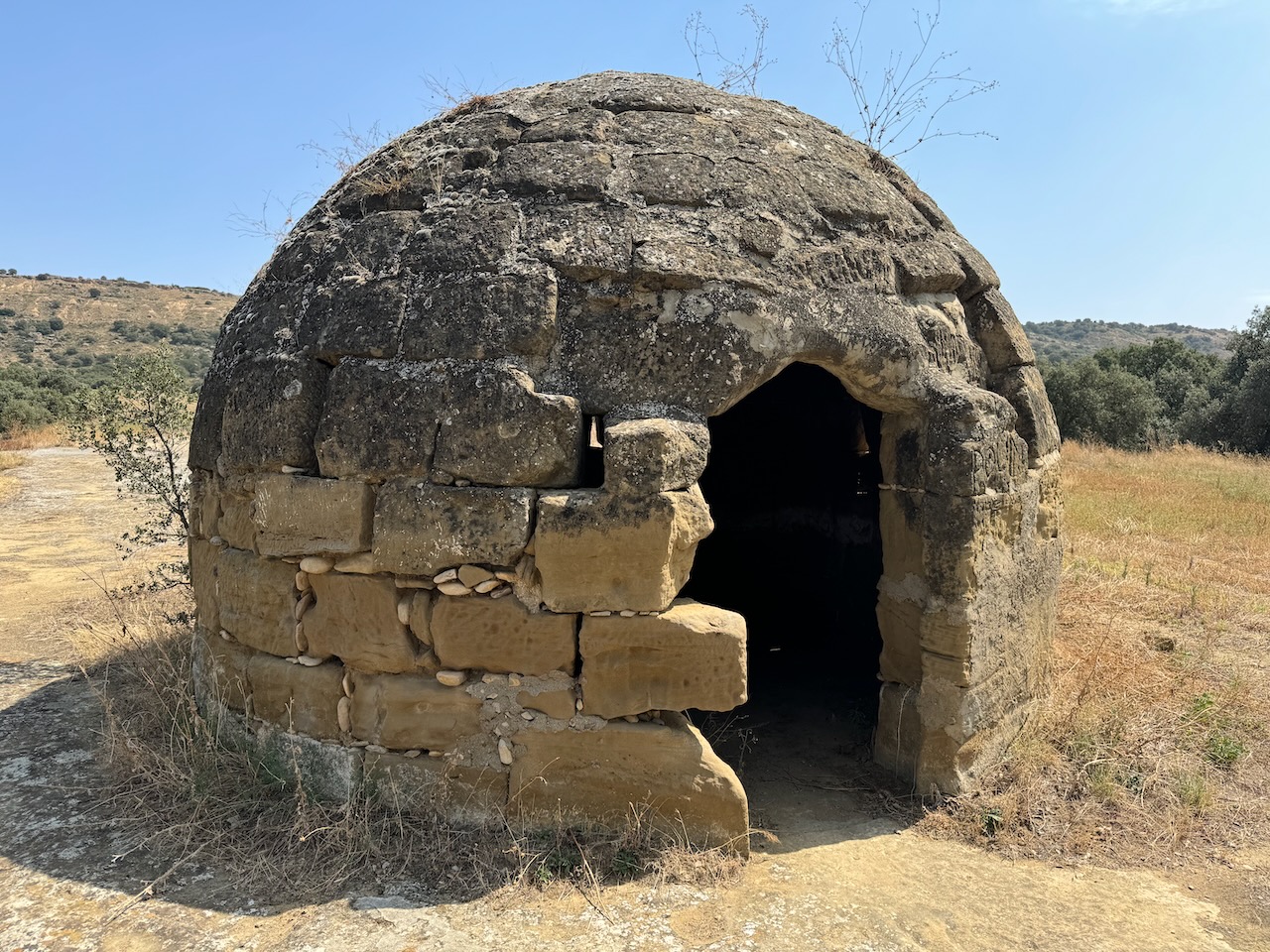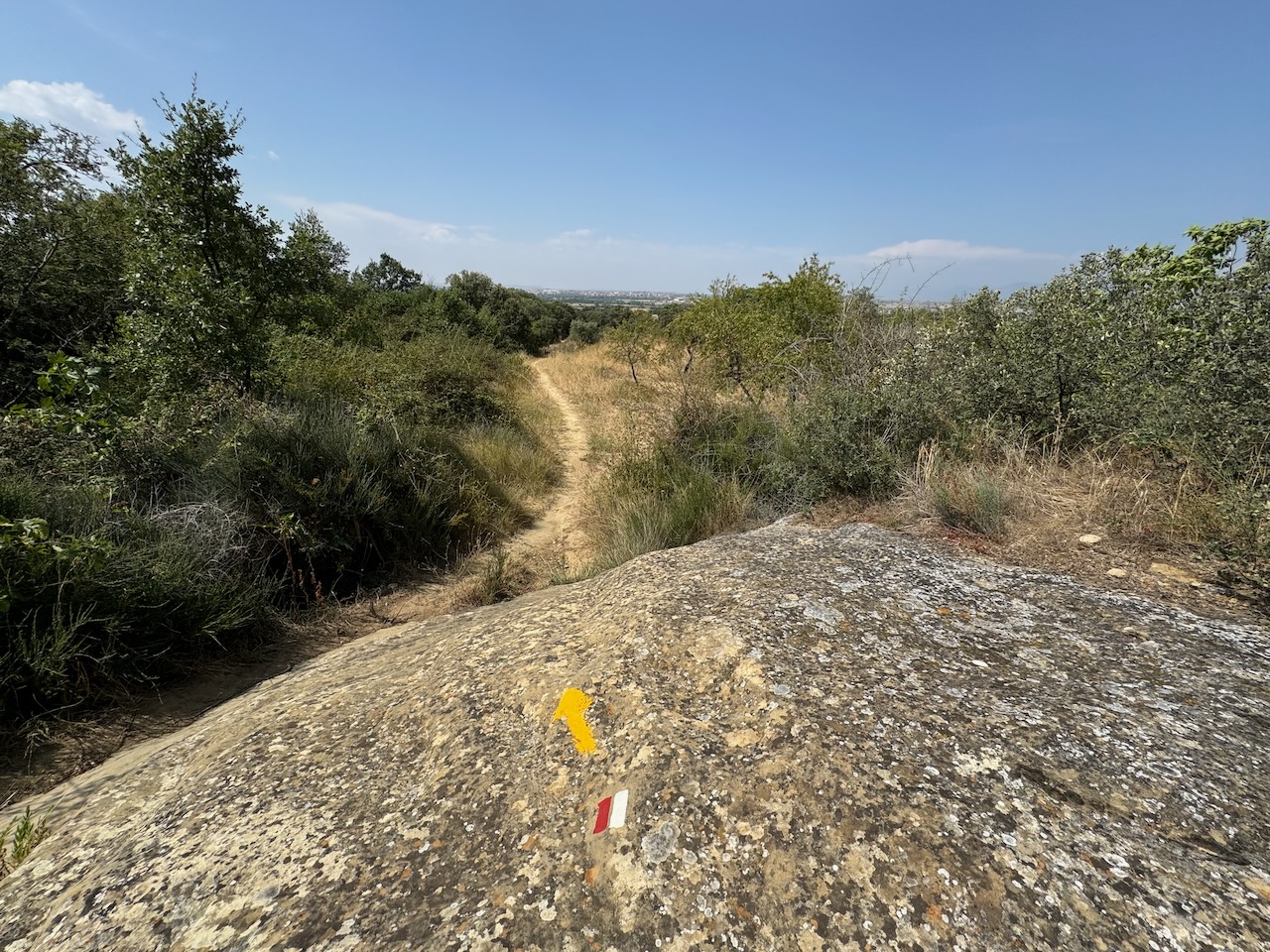Walked: 38Km 37.98Km (I puffed it up but then regretted doing it).

On my way to Huesca, I was amused to find this stone igloo which served as a panopticon for the field. A nearby panel explained that a watchman would sometimes be inside, but you wouldn't be able to tell from the outside. This would deter looters from taking fruit, because you didn't know if you would were being observed or not.
We are in harvest season, and these fields are full of apples, peaches, almonds, figs, pears and grapes. The fruit looks incredibly appetizing, especially to a bored and hungry pilgrim, but I've only eaten fruit from a tree in an orchard once and I didn't do it again. It felt wrong.
I take fruit indiscriminately from trees that appear to be semi-wild. They grow outside orchards, isolated, usually right next to the path. Sometimes, if I'm passing through an orchard, I will only seek fruit that has already fallen from the tree and is still in good shape, reasoning that it will go to spoil soon anyways.
It's difficult writing about your attempts at being moral. It feels distasteful, as if it were an immoral thing to do. In order to erase any attempt at virtue signalling, I will take a beer from the fridge at the albergue which is not mine. When I saw it in the fridge I thought: it is impossible that a pilgrim left a beer, in the thousands of kilometers I've walked I've never seen this. It probably belongs to a hospitalero. But I will drink it just to prove to you that I'm not a good person.
Ahhh. So good. Somehow what was morally reprehensible now became acceptable to myself just because I'm demonstrating I'm not a good person.

I like moral teasers. I must have encountered the trolley problem about 20 years ago, and I was fascinated by it. It serves a bit as a benchmark about how I reason about morality.
20 years ago I thought the right thing to do was to pull the lever in order to save five lives and sacrifice one.
10 years ago I thought the right ting to do was not to pull the lever, those five people are in the path of their own fate, and you can't sacrifice an innocent man's life unwillingly in order to save five people.
Now I think the choice can't be made without being there (without context). What you think you will do is an input on the totality of circumstances. How you feel about the situation as it happens is another input. Furthermore, when shit gets real what you might simply freeze and shit your pants, what you think you will do is often different from what you will actually do.
This became clear to me when I first read about the bystander effect. I resolved to never be that guy who just stands around because I expect someone else will do something about it. I was living in Mexico City at the time, and the very next day there was this monthly bike ride where they close off major avenues in order to create a 30Km+ circuit on the Sunday of the month.
At an intersection a lady tried to outrun a yellow light. In the middle of the road she changed her mind and hit her brakes abruptly. She lost her balance and fell off the bike, right in the middle of the intersection. A taxi was racing towards her. I immediately thought "shit I'm supposed to do something about this" but I was frozen. The taxi driver was an asshole, keeping on his lane as if he was going to run her over, while blaring his horn, only moving out of the way at the last second. After the taxi went through, two guys sprinted from their bikes to help her up.
I was disappointed with myself. I had resolved to do something in these situations, yet when the situation came I became an unwilling bystander. What's the point of thinking about how you are going to react, if you can't react as you thought you would? It's no different from thinking "oh I would give all my money to restore the health of a sick family member" yet the time comes and you don't do it because x, y or z. We must admit that we don't know (ourselves or the situation) enough to know how we will actually react.
